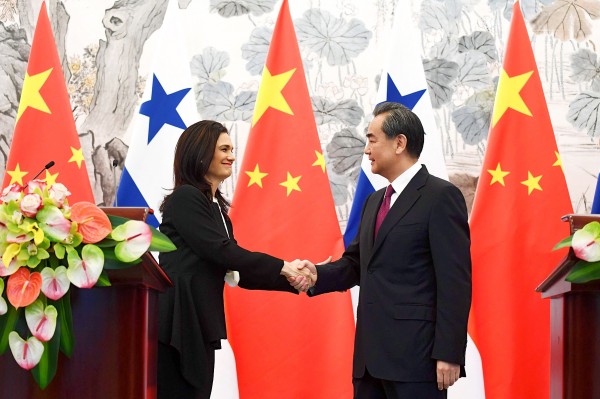《TAIPEI TIMES》 Panama seduced by money, desire to deflect: sources

Panamanian Minister of Foreign Affairs Isabel de Saint Malo, left, shakes hands with her Chinese counterpart, Wang Yi, during a joint press briefing on June 13 after they signed a joint communique agreeing to establish diplomatic relations in Beijing. Photo: AFP
By Lu Yi-hsuan and Jake Chung / Staff reporter, with staff writer Staff reporter, with staff writer
Chinese offers of money for infrastructure projects and the wish to divert the Panamanian public’s attention from domestic affairs were the main reasons for the nation’s abrupt decision to switch recognition from the Republic of China (ROC) to the People’s Republic of China (PRC), sources said.
Taiwan on Tuesday cut diplomatic ties with Panama after the Central American country switched diplomatic recognition from Taipei to Beijing earlier on the same day.
The large amount of Chinese investment on the table played a significant role in Panama’s decision, a source said, adding that Juan Carlos Varela — a businessman before entering politics — places heavy emphasis on commerce and profits.
Over the past three years, China has invested US$25 billion into various public infrastructure projects in the nation, and in just the past three months has offered loans worth more than US$8 billion, the source said.
In comparison, the Ministry of Foreign Affairs only has an annual budget of NT$24 billion (US$789.97 million), the source said, adding that while the ministry had offered to step up cooperation in education and medical facilities, the scale of the projects were incomparable with China’s.
The Panamanian government had not asked Taiwan to increase the scale of its aid over the past two years, a source said.
Panama switched recognition despite repeatedly assuring Taiwan that there were no such plans, sources said.
Taiwan reportedly received information that Panama was “engaged in political talks with China,” but the Taiwanese embassy in Panama later assessed that the nation was, at that time, in the early stages of its negotiations with China, the sources said.
Taiwanese in Panama informed the Taiwanese embassy 48 hours before the Panamanian government’s official announcement that Panama was preparing an important media announcement and that it might be about switching recognition to Beijing.
Despite the Taiwanese embassy repeatedly urging the Panamanian government to confirm the allegation, the Panamanian government at the time staunchly denied it was planning to do so, the sources said.
Panamanian Deputy Minister of Foreign Affairs Luis Miguel Hincapie at the time told the embassy “he was not aware of such announcements,” the source said.
However, Hincapie was one of only four people in the whole of Panama to know about the planned switch, the sources said, adding that the other three were Panamanian President Juan Carlos Varela, Panamanian Vice President Isabel Saint Malo and an unidentified administrative staff member.
The embassy, after receiving official notice from the Panamanian government of its intention to switch recognition only 40 minutes before the announcement, asked the president of the Panamenista Party, Jose Luis Varela — Juan Carlos Varela’s brother — to telephone the president to try and persuade the him to change his mind, the source said.
Ten minutes before the Panamanian government’s official announcement, Jose Varela called back to say that there was no way to do so, the source said.
The source surmised that Juan Carlos Varela was seeking to deflect attention from domestic politics due to recent policy flops, which have reportedly seen his approval ratings plunge.
There are up to 300,000 ethnic Chinese in Panama, comprising of 8 percent of President Varela’s voting base, the source said.
There are only about 300 Taiwanese businessmen and embassy staff in Panama, the source said.
新聞來源:TAIPEI TIMES















